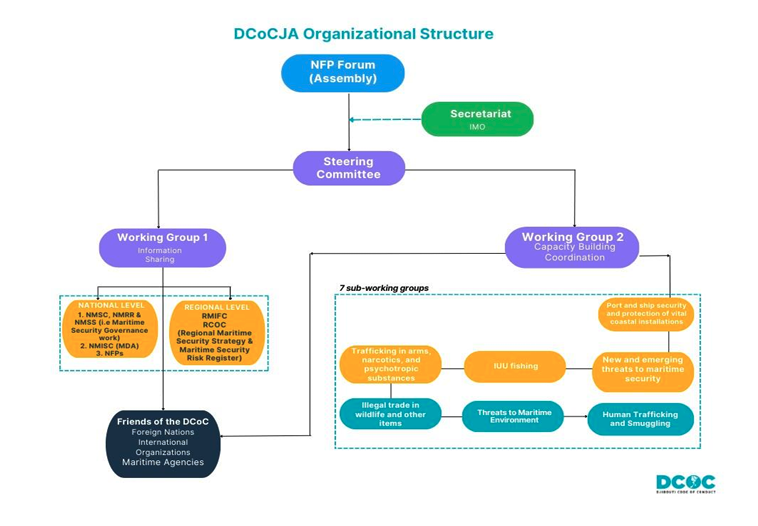Regional maritime security strategy supported by IMO
Regional meeting discusses illicit maritime activities
SOUTH AFRICA: A regional meeting that brought together high-level stakeholders to discuss strategies to promote a common maritime security plan for States around the western Indian Ocean and Gulf of Aden was held in Cape Town last week where three resolutions were adopted that will allow for the creation of sub working groups to address a number of illicit activities at sea.
| The Djibouti Code of Conduct was adopted in 2009 to bring States in the region together to tackle piracy and armed robbery against ships. Over time, the Code has seen its scope significantly broadened to cover emerging maritime threats including illegal, unreported and unregulated (IUU) fishing and the trafficking of people and weapons. In 2017, DCoC signatories adopted a revised Code of Conduct, known as the Jeddah Amendment to the Djibouti Code of Conduct 2017 (DCoCJA).The Jeddah Amendment builds on the earlier Code, which was adopted in 2009, and calls on signatory States to cooperate to the fullest possible extent to repress transnational maritime crime of all kinds. |
|
Convened by the International Maritime Organisation (IMO); hosted by the Republic of South Africa and supported by the Indian Ocean Commission and CRIMARIO II Project, the meeting was chaired by Sobantu Tilayi, Chief Operating Officer of the South African Maritime Safety Authority and co-chaired by Rear Admiral Naji Al-Juhani from the Kingdom of Saudi Arabia.
The meeting was attended by 77 participants from 14 Djibouti Code of Conduct (DCoC) Signatory States and 17 observers, including the European Union, Denmark, India, Indian Ocean Commission, United States of America and the United Kingdom.
The meeting agreed in principle for the need to develop a regional maritime security strategy – and tasked the IMO with developing a concept paper to be shared through the Steering Committee.
|
The new Steering Committee is as follows;
- Chairperson- Republic of South Africa
- Deputy Chairperson-Kingdom of Saudi Arabia
- Chair Working Group 1- Yemen
- Deputy Chair-WG1- Comoros
- Chair Working Group 2 -Seychelles
- Deputy Chair Working Group 2-Somalia
|
|
Addressing the meeting on behalf of the IMO Secretary-General Kitack Lim, Heike Deggim, Director, Maritime Safety Division described the Djibouti Code of Conduct/Jeddah Amendment as “an indispensable element for the assurance of regional maritime safety and security”.
She noted that, while there has been a reduction of piracy in the region since 2012, illegal, unregulated, and unreported fishing (IUU), human trafficking and smuggling, marine pollution, wildlife trafficking, and crude oil theft remain prevalent.
“Additionally, new and emerging threats, such as cyber-attacks against ships and maritime business, as well as innovative methods targeting vital coastal installations using drones and mines, are evolving issues that demand our consistent attention and collaborative efforts,” she added.
Resolutions adopted
The primary objectives of engagements were to identify means to operationalise the DCoC Information Sharing Network, address evolving maritime challenges and security priorities of Signatory States, and agree on the concrete measures to be adopted by Signatory States in implementing Article 2 of the Jeddah Amendment.
In support of these objectives, the Participants considered and adopted the following three resolutions:
Resolution 1 Operationalisation of the DCoC/JA Information Sharing Network
The meeting adopted the mission and vision of national maritime information sharing centres (NMISCs), with DCoC Standard Operating Procedures (SOPs) to facilitate coordinated, timely, and effective information flow among the Participants, to promote communication, coordination and cooperation, both civilian and military.
Resolution 2 Development of a DCoC Signatory States' Maritime Security Strategy
Besides establishing National Maritime Security Committees (NMSC) and National Maritime Information Sharing Centres (NMISC) in each member State through the IMO Maritime Security Governance project, participants committed to develop a Regional Maritime Security Strategy, to steer implementation of the DCoC/JA and coordinate activities of competent agencies through inter-agency cooperation.
Resolution 3 Establishment of thematic sub-working groups on capacity building coordination
The establishment of sub-working groups responsible for coordinating various thematic areas encompassed in Article 2 of the Code of Conduct was approved. This expansion aims to integrate existing mechanisms, avoiding redundant efforts. The sub working groups will cover:
- IUU (Illegal, Unreported, and Unregulated Fishing), chaired by Tanzania
- Port and ship security and protection of coastal installations, chaired by Ethiopia
- New and emerging threats to maritime security, chaired by Oman (chair to be confirmed)
- Trafficking in arms, narcotics and psychotropic substances, chaired by Madagascar
- Illegal trade in wildlife and other items in contravention with the Convention on International Trade in Endangered Species of Wild Fauna and Flora (CITES), chaired by Kenya
- Threats to maritime environment, chaired by Mauritius
- Human trafficking and smuggling, chaired by Maldives
Governance framework
The implementation of the DCoC(JA) is delivered under a governance framework that comprises of a Steering Committee, a Working Group on Information Sharing and a Working Group on Capacity Building Coordination.

The Republic of South Africa was elected Chair of the Steering Committee, with the Kingdom of Saudi Arabia as Deputy Chair. Yemen is the new Chair of the Working Group on Information Sharing, with Comoros as Deputy. Seychelles is Chair of the Working Group on Capacity Building Coordination, with Somalia as Deputy.
The next High Level Meeting will be held in the Republic of Tanzania from 22 – 24 October 2024.
PHOTO: Sindisiwe Chikunga, the South African Minister of Transport addresses the meeting with Sobantu Tilayi in the background who chaired the meeting.
666